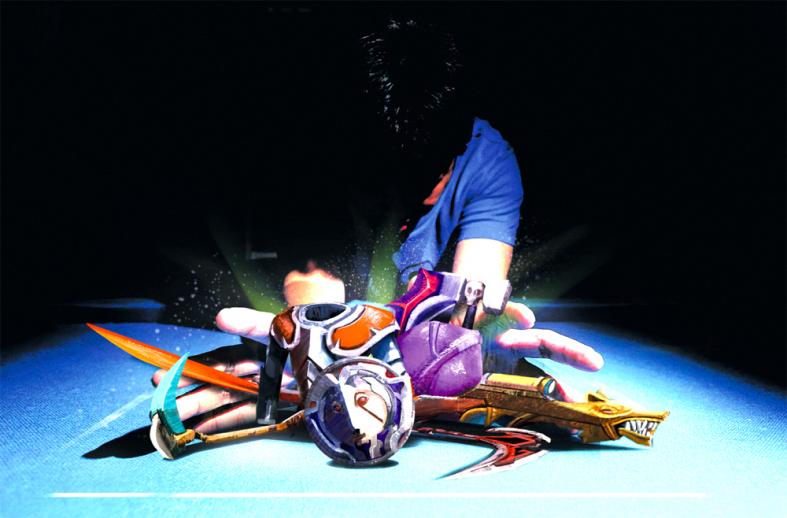Gamers betting hundreds of dollars on e-sports
Online games like Dota 2 are drawing gamers who place hundreds of dollars in bets daily on tournaments
He makes up to 20 bets a day, with each wager worth up to $100.
But instead of betting on football or horses, he is betting on matches in online game Dota 2.
The 38-year-old, who wanted to be known as Lestat, told The New Paper: "It is actually just a hobby, something novel."
Dota 2 is an online game developed by Valve Corporation that has seen increasing popularity here, boasting a peak of close to a million concurrent players each day.
There are also tournaments where teams are pitted against one another, and the winners walk away with cash prizes.

Games like Dota 2 and Counter-strike: Global Offensive have given out millions of dollars in thousands of professional tournaments since their inceptions in 2011 and 2012 respectively.
The annual The International Dota 2 Championships kicked off on Monday, with a prize pot of US$20 million (S$27 million).
Such tournaments are funded largely by cosmetic items that players buy in cash. They are worth between one cent and a few thousand dollars.
Many of these items are also sold by players on online platforms such as Carousell and forums, allowing gamers to convert them back into actual cash.
Gamers use these items to place their bets when they gamble.
Lestat, who works in the finance industry, said he started playing Dota 2 in 2013 and ended up buying items for the sake of betting.
The betting is done on third-party betting sites, of which there are dozens.
LOSSES
Since he started betting in 2013, Lestat said he is down by about $2,000, but it does not bother him.
"I feel that for any sort of betting to be healthy, the individual must view it as an expense and accept it as such," he said.
"I buy my thrill like how I pay for alcohol."

He estimates that his current inventory of cosmetic items is worth $2,000, and he has won as much as $300 worth of items on a single bet, while his biggest loss was worth around $200.
Another gamer who wanted to be known as Zane, a 19-year-old serving his national service, said he started betting on Dota 2 matches when he was introduced to it three years ago.
Then 16, he had only $5 worth of cosmetic items.
Since then, he has placed hundreds of bets and has accumulated an inventory which he estimates is worth at least $1,000.
He used to place up to seven bets each time, with each wager worth up to $10.
"I look at it as similar to gambling during Chinese New Year. As long as I don't spend too much on it or have to sustain the habit by pumping in more money, it is fine," he said.
Zane claimed that more than half of the gamers he knows also gamble on the game.
Lestat said the danger for young people is higher, as their parents cannot monitor them.
"Young people can bet through websites, and parents can't monitor them. They start small, betting 50 cents to $1, and their parents have no idea that they are gambling," he said.
"The danger is there. In that sense, it can always spiral out of control."
Professional Dota 2 player Wong Jeng Yih, 26, better known as NutZ, told TNP that gambling is widespread, and it has become part and parcel of the game.
"I think it is good to have it, as a kind of interaction (in which) spectators feel like they are part of the game," he said.
"I personally do not bet, just because I'm not interested in doing so."
He added that it would be difficult to stop people from betting, as access is freely available.
Counsellors told TNP that addiction to gaming and gambling makes for double the problem, while lawyers say that it could be illegal to participate in such gambling.
Young people can bet through websites, and parents can't monitor them. They start small, betting 50 cents to $1, and their parents have no idea that they are gambling.
- Lestat
Young people more at risk of getting addicted
Gaming addiction is already a problem, but with gambling, the problem has become twofold.
Counsellors told The New Paper that gamers who also gamble are a concern, especially when they are young.
Dr Rajesh Jacob, a psychiatrist at Promises Healthcare, said such addictions follow the same principles of addiction to alcohol and drugs.
"It is a cycle. When satisfaction is not attained, they do it more and end up suffering from social dysfunction," he said.
"It is the same with gaming. When addicts are not allowed to game, they suffer from withdrawal."
But with the two put together, he feels there might be more problems.
"One can lead to the other... It becomes a double whammy, leaving the person addicted to both activities."
He added that young people are more at risk.
"Youngsters are more impulsive, and addiction to gaming might then lead to further thrill-seeking behaviour," he said.
"Singapore has control (over) alcohol, drugs and gambling, but how is it going to control online game gambling?"
Dr Brian Yeo, a consultant psychiatrist at Mount Elizabeth Hospital, added: "(Such gambling) is innocuous at the start, but it has the potential to entrap large numbers of young people.
"Their parents will probably buy them tokens or credits, thinking it is just gaming, they won't think that their children are gambling."
ILLEGAL?
Lawyers told TNP that engaging in such betting might be illegal, even though enforcement is not easy.
Criminal lawyer James Ow Yong from Kalco Law said the Remote Gambling Act prohibits unlawful remote gambling including betting.
"Wagering on these items or 'rares' would be caught under the definition of betting under the Act.
"People who engage in such betting expose themselves to prosecution," he said
He added that the providers of the service, such as the betting sites, could be liable as well.
But he admitted it might be difficult to prosecute offenders.
Criminal lawyer Edmond Pereira from Edmond Pereira Law Corporation agreed.
"Maybe there have been no complaints, but as far as I know, the authorities are not looking at it yet," he said.
"But how are they going to check? If I am 15 and the site requires one to be 18 to join, I am going to say I am 18 and you'll never know."
He added that it would be difficult to create specific laws to regulate such gamblers.
"This is something virtual, that is unknown, unseen and unheard," he said.
Dr Yeo feels that the only way to prevent the problem is for these gamers to be educated about the dangers from young.
"We can't say no gaming, so the real question here is, can we teach people?"
Helplines
Where to go for help if you have a gambling habit, or if you know someone who needs help:
The National Council on Problem Gambling helpline
1800-6668-668
Blessed Grace Social Services
8428-6377
One Hope Centre
6547-1011
E-sports also hit by match-fixing
As with traditional sports, there have even been cases of match-fixing, such as Malaysian Dota 2 player DDZ, who was found guilty of accepting money to lose a game in 2014.
He was subsequently banned from participating in the Synergy League, a regional Dota 2 tournament, for life.
Professional Dota 2 player Wong Jeng Yih, 26, better known as NutZ, told The New Paper that match-fixing is very much a reality in e-sports.
He said: "I've heard of players doing it... people pay them to lose the game.
"Teams do get tempted..."
Lestat (not his real name), a 38-year-old who works in the finance industry, believes that a lack of funding could be what tempts gamers to take bribes.
Compared to traditional sports, he said "gamers have fewer options (in terms of) earnings so they might be open to other possibilities, such as betting (on the game)or compromising their professionalism".
Another Dota 2 gamer, Zane, 19, who is serving his national service, added: "It can be very 'kelong', and there are people who actively rig games for profit.
"It takes the fun out of the game, but it is something we can't really control."
Get The New Paper on your phone with the free TNP app. Download from the Apple App Store or Google Play Store now




